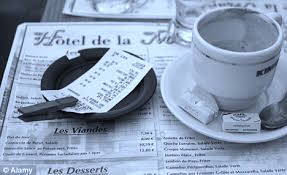 Last night, in the bath, I was listening to a Ted talk by the author of Eat, Pray, Love – a book I have still to read but was hugely put off by the glacially-long and tedious film of the same name.
Last night, in the bath, I was listening to a Ted talk by the author of Eat, Pray, Love – a book I have still to read but was hugely put off by the glacially-long and tedious film of the same name.
Anyway, Ms Gilbert gave an engaging lecture with some great ideas and illumination to anyone facing the odd day/week/month/lifetime of artistic struggle. The part that particularly intrigued me was the suggestion that ‘outside forces’ might be assisting with the creative process; in fact in Roman times they apparently believed that ‘genies’ lived within the walls of an artist’s/writer/creative person’s work space and would appear, insinuating themselves into the tortured virtuoso, to help steer the work in the right direction.
Certainly when I am at my most involved it’s true that words and phrases do shuffle forth and present themselves, seemingly with me having nothing to with it, and those are often the most flowing and free sections. So, is there a genie sitting on my shoulder having materialised from behind the plaster-board or is it just the brain shutting off all exterior influence and ‘going for it’?
At the moment one of my projects in re-writing a short story as a novel. This morning I was ambling around a paragraph of said work, stopping and starting, changing, not quite sure what I was doing. As I added in a couple of lines which were possibly more decoration than moving anything concretely forward, the genie suddenly poked me and we were off on a completely different plot line, me running behind: ‘wait . . .I’m not sure if this a good idea.’ But having looked at it a few times, it works, and I’m looking forward to continuing with this whole new tangent that I don’t think would have occurred to me if I had sat down with notebook and tried to plan ahead.
I run to the main road, catch a bus and claim the upstairs front seat. Poems are still shuffling about in my mind: stanzas, couplets, brave paragraphs and solitary dangling words. I stare out on pubs, hardware shops, hairdressers, couples arguing and couples entwined.
Miniature universes surround me, even on the seat across the aisle; that young man engrossed in reading a letter . . . his expression when he opened drew the sheet of paper from the envelope then folded it, put it away to then retrieve it again. Something he couldn’t take in the first time: love, death, revenge, hatred . . . loss?
Above, the section I was fiddling with when seized with the idea of making the young man and his letter part of the plot rather than more of an embellishment to the main storyline – a whole new direction in the book which I hadn’t planned at all . . . confusing; quite a bit of re-juggling but a new turn that I’m happily reflecting on as I go about the rest of the day’s jobs.



 Last night, in the bath, I was listening to a Ted talk by the author of Eat, Pray, Love – a book I have still to read but was hugely put off by the glacially-long and tedious film of the same name.
Last night, in the bath, I was listening to a Ted talk by the author of Eat, Pray, Love – a book I have still to read but was hugely put off by the glacially-long and tedious film of the same name.